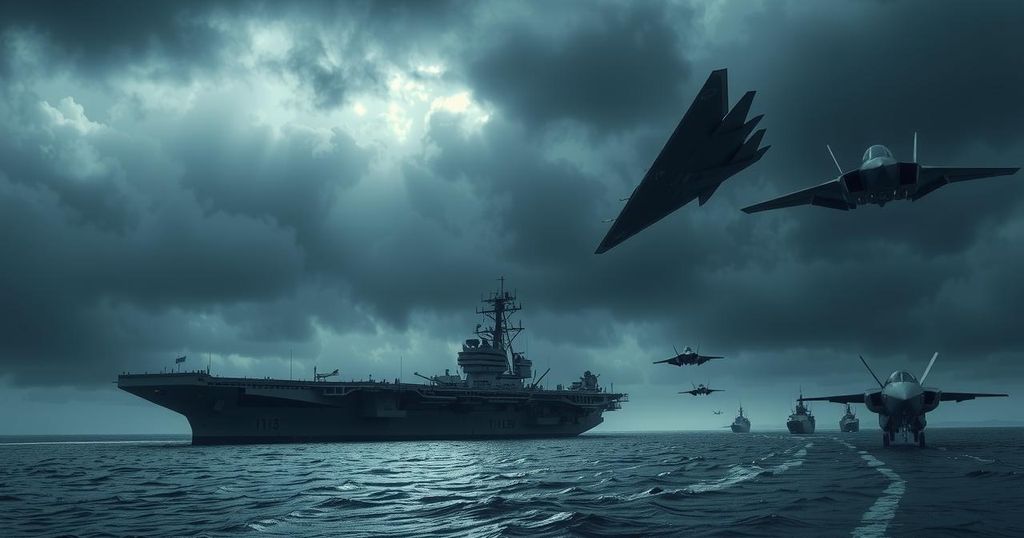Heightened Tensions: U.S. and Israel’s Strategic Focus on Iran and Regional Threats
The U.S. is intensifying its focus on Iran amid threats from President Trump, as Israel evaluates multiple security challenges, including Hamas and Hezbollah. Military movements signify rising tensions, with ongoing operations in Gaza proceeding cautiously. Concerns regarding intelligence leaks and troop shortages highlight the complexities of the current situation, calling for an urgent response to the evolving threats in the region.
The United States has intensified its focus on Iran, with escalating threats from President Donald Trump and noteworthy troop movements, including bombers and aircraft carriers toward the Middle East. Israel is currently assessing the most urgent threats it faces, which include Iran’s influence, as well as those from Hamas, Turkey, Hezbollah, and the Houthis. Prime Minister Benjamin Netanyahu is under pressure as the security situation unfolds across multiple fronts.
President Trump’s recent statements indicate a tough stance against Iran. He asserted that any attack from Yemen would be treated as if it directly originated from Iran, intensifying military posture against the Iranian regime. This rhetoric accompanies ongoing efforts to exert pressure on the Houthis, although their rocket attacks toward Israel persist, affecting civilian life.
The evolving situation raises questions about the possibility of military action; however, it remains uncertain whether the heightened rhetoric is part of negotiation strategies regarding Iran’s nuclear program or indicative of an imminent region-wide conflict. Iran has expressed openness to negotiations through a third party in response to Trump’s threats.
Meanwhile, U.S. military movements signal increasing tension. Five B-2 stealth bombers have arrived at Diego Garcia, suggesting a stronger military presence in the region. The Pentagon has decided to extend the USS Harry S. Truman’s deployment and send the USS Carl Vinson as well. Close coordination with Israeli defense systems has proven effective in intercepting missiles aimed at Israel.
However, the complexity of the regional dynamics is underscored by intelligence leaks reportedly tied to Israel. Recent revelations concerning a White House discussion around a planned attack have raised concerns within Israeli security circles, exposing the delicate balance of operations and intelligence sharing between allies.
On the ground in Gaza, the Israeli Defense Forces (IDF) are conducting operations at a measured pace, targeting Hamas leaders while simultaneously managing the broader context of regional adversaries. Although military operations are ongoing, Israel does not appear prepared for a large-scale ground offensive at this time.
Despite the restrained approach in Gaza, the IDF faces challenges of troop shortages and public fatigue regarding military service, particularly with the exemption of certain societal groups. Outgoing IDF spokesperson Brigadier General Daniel Hagari emphasized the need for increased military personnel now, rather than delaying recruitment, framing the urgency of the current wartime conditions.
Overall, the escalated U.S. posture toward Iran, combined with Israel’s multi-front security considerations, indicates a critical juncture in Middle Eastern relations that continues to evolve under the pressures of military strategy and regional politics.
In conclusion, the current geopolitical climate reflects heightened tensions between the United States and Iran, as well as among various Middle Eastern factions. With escalating threats from President Trump and strategic military movements, Israel finds itself in a precarious position, addressing multiple security challenges. Israeli officials are concerned about intelligence leaks and the implications of ongoing military operations, particularly in Gaza, where pressures remain high. Ultimately, the situation requires careful navigation and increased military readiness in anticipation of possible future developments in the region.
Original Source: www.ynetnews.com




Post Comment